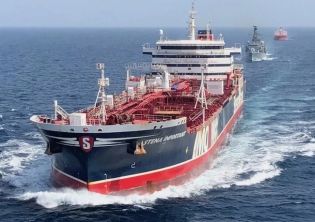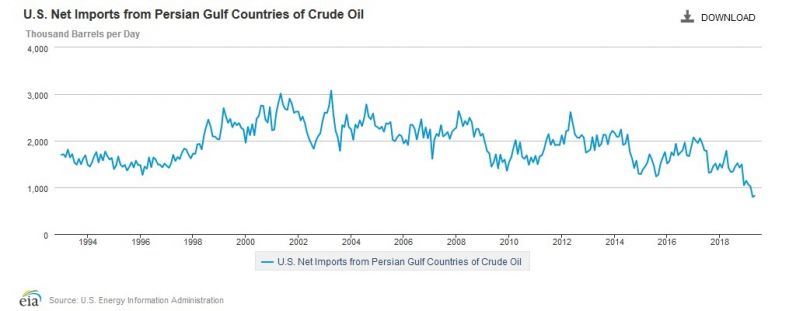
(CNSNews.com) – President Trump said Tuesday the Iranians were not seizing U.S. ships in the Strait of Hormuz because few U.S. tankers use the Persian Gulf chokepoint nowadays – “because we have our own oil and gas.”
“Very few American boats are there,” Trump told an audience at a petrochemicals plant in western Pennsylvania.
The Iranians, he said, were “capturing boats from other countries. They’re not taking our boats.”
“And one of the things that was brought up by the media, actually – and wisely and correctly brought out – we have very few boats going there anymore because we have our own oil and gas,” Trump continued. “We don’t need it from the Middle East anymore.”
The Iranian regime’s threats to foreign commercial vessels have prompted the U.S. to call for a coalition of nations to provide security for their flagged ships in the strait. Britain, one of whose tankers has been seized by the Islamic Revolutionary Guard Corps (IRGC), is the first country to have announced it’s ready to join the effort.
The U.S. Maritime Administration has advised U.S.-flagged ships planning to transit the strait to inform the U.S. Fifth Fleet and the U.K. Maritime Trade Office in advance, and immediate inform them if Iranian forces hail or attempt to board them.
Trump referred to the Hormuz situation in the context of remarks on U.S. energy independence, telling the crowd in Monaco, Pa. that the administration wants to move from a situation of energy independence to one of “American energy dominance.”
“Instead of relying on foreign countries, we are now relying on American producers,” he said. “And we are relying on American workers to build our own future right here on American soil. It’s time.”
According to the U.S. Department of Energy’s Energy Information Administration (EIA), U.S. net imports (imports minus exports) of crude oil and other petroleum products have been dropping steadily since a peak in 2005.
In 2018, net imports of petroleum products dropped to just 11 percent of total U.S. consumption – the lowest percentage since 1957. (It was at more than 60 percent in 2005.)
Taking crude oil alone, EIA data show that net U.S. imports stood at 3.6 million barrels per day (b/d) in February this year, down from a record high of 10.6 million b/d in 2006, and the lowest since 1987.
And the list of the top suppliers of crude is no longer dominated by countries in the Persian Gulf. Three of the biggest five suppliers to the U.S. in May this year were not in the Gulf region – Canada (3.3 million b/d), Mexico (0.60 million b/d), and Colombia (0.39 million b/d ). The other two were Saudi Arabia (0.54 million b/d) and Iraq (0.36 million b/d).
(In 2018, about 16 percent of U.S. petroleum imports came from Persian Gulf countries, compared by 43 percent from Canada.)
Net U.S. imports of crude oil from all Persian Gulf suppliers in April this year were recorded at 0.79 million b/d, lower than it has been in any single month in EIA data beginning in January 1993.
On Tuesday, Iranian foreign minister Javad Zarif said U.S. intervention was the main cause of insecurity in the Persian Gulf.
“Adding foreign naval fleets in this narrow crowded tinderbox only increases risk of combustion,” he tweeted.
“If the U.S. wants maritime security, it should stop its destabilizing behavior.”
The Iranian regime claims it seized the British-flagged tanker Stena Impero in the strait last month because it violated international maritime rules. The shipping company and British authorities dispute that, and say it was in Omani territorial waters when boarded.
The IRGC had been threatening to seize a British tanker ever since an Iranian supertanker was detained in Gibraltar, a British territory, two weeks earlier on suspicion of transporting oil to Syria in breach of European Union sanctions. Tehran accused Britain of “piracy.”
Iran said this week an agreement that would release its ship, the Grace I, was imminent, although the Gibraltar authorities disputed that. A court in the territory is expected to make a decision on Thursday regarding the fate of the ship.
Source material can be found at this site.










